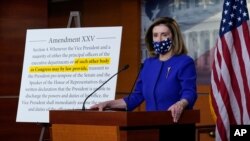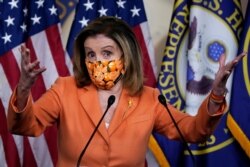With just hours left before a self-imposed deadline, U.S. House Speaker Nancy Pelosi says she and the Trump administration have made some progress in their negotiations over a second round of financial aid to address the coronavirus pandemic.
Pelosi said Monday during a television interview that she and Treasury Secretary Steven Mnuchin narrowed their differences during an hour-long phone call earlier in the day. She said the administration has reached the point where they are ready to reach an agreement, and that the two sides will speak again Tuesday to determine where each side stands.
“Let’s make a judgment,” Pelosi said on the cable news network MSNBC. “We may not like this, we may not like that, but let’s see on balance if we can go forward.”
Pelosi has set Tuesday as the final day to reach a deal with the Trump administration before the presidential and congressional elections, which are just two weeks away on November 3.
If negotiations between the White House and the Democratic-majority House of Representatives fail, the next opportunity for negotiations on aid will come during a lame-duck session of Congress in November and December.
Pelosi has said the two sides are far apart on providing emergency funding for cash-strapped state and local governments and language that spells out a COVID-19 tracing and testing strategy.
U.S. lawmakers have repeatedly failed to reach an agreement on a second round of economic aid to millions of Americans impacted by the pandemic. In September, Senate Republicans failed to pass a slimmed-down $500 billion aid proposal. The House passed the $2.2 trillion Heroes Act in June and has so far rebuffed the administration’s offer of $1.8 trillion for a new round of aid.
Senate Majority Leader Mitch McConnell announced the Senate will vote on another $500 billion proposal Wednesday. That bill would provide funding for a new round of unemployment benefits and the popular Paycheck Protection Program (PPP).
During remarks on the Senate floor Monday, McConnell criticized Pelosi for taking an “all or nothing approach” to a new coronavirus relief package, and said her “Marie Antoinette act needs to end,” a reference to the 18th century French queen with a reputation for flamboyance.
McConnell’s Democratic counterpart, Minority Leader Chuck Schumer, called the Republican plan “emaciated.”
President Donald Trump announced an end to negotiations on a new round of aid earlier this month before reversing course and tweeting, “Go big or go home!” His expression of support for a larger topline number closer to House Democrats’ asks for close to $2 trillion and has caused discomfort among many Senate Republicans.
But the president appeared to dampen hopes of a final deal during a campaign stop in Arizona Monday, saying Pelosi “at this moment, does not want to do anything that’s going to affect the election.”
The $2 trillion CARES Act, passed by bipartisan agreement in March, was one of the largest aid packages in U.S. history, providing $600 in weekly enhanced unemployment benefits for millions of out of work Americans. The weekly benefits expired on July 31.
The U.S. economy is showing some signs of recovery from the lockdowns instituted earlier this year to contain the spread of the virus. More than 11.4 million jobs have been recovered, and there are signs of increased hiring in hard-hit industries such as tourism.
New unemployment claims jumped last week to more than 890,000, the highest level since mid-August, although continuing unemployment claims dropped to 10 million.
The U.S. leads the world with just over 220,000 COVID-19 deaths, as well as infections, with more than 8 million cases total, according to Johns Hopkins University.





